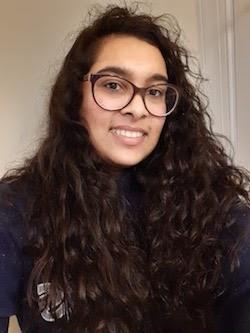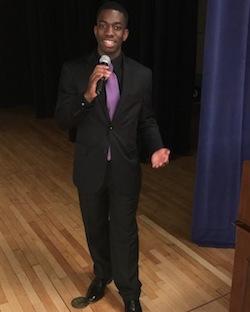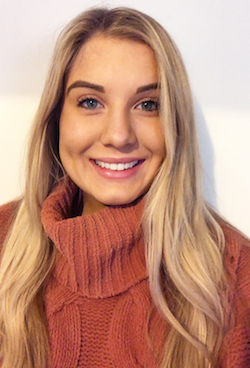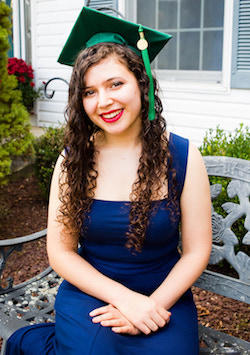In This Story
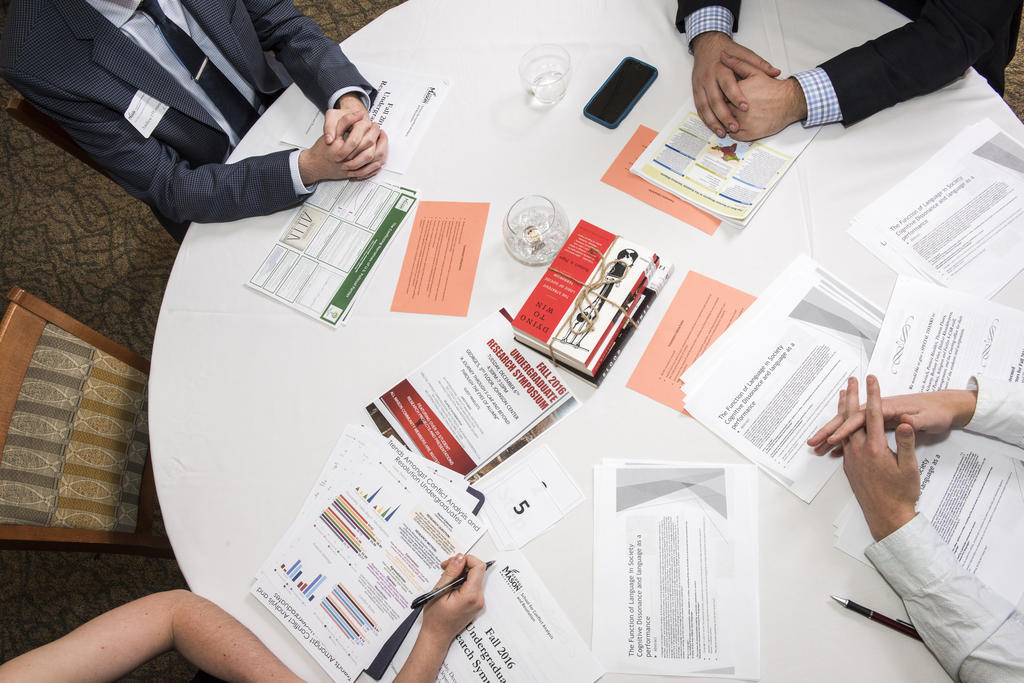
Every semester, the Carter School’s Undergraduate Research Symposium offers graduating Conflict Analysis and Resolution students the opportunity to share their research with faculty and classmates. Normally held in person, the Fall 2020 symposium was held virtually because of the ongoing COVID-19 pandemic.
At the end of each semester at George Mason University’s Carter School for Peace and Conflict Resolution, the Undergraduate Research Symposium is a familiar ritual.
After spending a semester conducting original research on conflict and its resolution, the graduating students of the Carter School’s CONF 490 capstone course gather to present their findings. Faculty mentors provide feedback to support their growth as researchers, while students in CONF 301 (Research and Inquiry in Conflict Resolution) are invited to learn from and engage with their peers’ experiences.
However, nothing about the Fall 2020 semester has been as usual.
As part of its response to the COVID-19 pandemic, many of George Mason University’s courses were conducted virtually during Fall 2020. For the Carter School, that meant taking the CONF 490 course and its culminating symposium entirely online for the very first time.
On Monday, November 30, instead of gathering on Mason’s Fairfax campus, the Carter School community gathered on Zoom to hear from the 30 undergraduate students who had conducted capstone research throughout the semester.
The virtual Fall 2020 Undergraduate Research Symposium was held across two sessions, one in the morning and one in the evening, to accommodate the variety of time zones from which the students and faculty were joining, including from Mason Korea. The dual sessions also allowed students to be able to meet in small groups with faculty mentors, with breakout rooms serving as substitutes for the usual roundtables.
“This has been an unusual semester in all shapes and forms,” said Carter School Dean Alpaslan Özerdem during his opening remarks.
He noted that the pandemic has affected the entire community, often in different ways. However, he said there was something constant in “the way our students reacted to those changes imposed on us in terms of the delivery of our teaching.”
He congratulated the students on their deep engagement with their research even in the midst of unexpected and difficult times.
“That’s the spirit of the Carter School. Nothing can stop us,” he said.
This fall’s CONF 490 students grappled with many of the same opportunities and challenges as those in previous semesters, such as refining their ability to conduct original research.
“It was difficult in the beginning to figure what exactly we were supposed to be doing, and this is because this research was all [on] us. It was our topic, our research, and we could go at it any which way we wanted,” said Mercy Wadhwa, who is graduating with a B.S. Conflict Analysis and Resolution and a concentration in Collaborative Leadership.
The CONF 490 instructors, Associate Professor Patricia Maulden and Associate Professor Leslie Dwyer, worked closely with the students to help them refine their projects and address the unique issues presented by an ongoing pandemic.
“Research this semester was challenging to say the least,” said Phillip Robinson, who is graduating with a B.A. in Conflict Analysis and Resolution and a concentration in Global Engagement. “There are only so many places to go when everything is shut down, and focusing can be extremely difficult if you stay in one or two spots around your house.”
Robinson’s research sought to illuminate the “inherent discrimination” in “practices of gerrymandering, gentrification, and redlining.” While he initially hoped to do “conventional interviews,” the pandemic made this method of data collection more difficult. He found that he needed to incorporate flexibility and ingenuity into his plan in order to identify different methods for his study.
“My different methods meant frequenting my local library rather than spending all of my time online, finding different interview transcripts, and asking relatives if they were aware of my topic and if they knew anyone who would be willing to describe their experiences,” Robinson said.
Needing to conduct research in a virtual environment provided Lily Krietzberg with new opportunities for data collection during her study, which engaged with “the many traumas that Indigenous communities face at the hands of genocide and colonialism, how these traumas are passed through generations and compounded by contemporary issues, and how restoring Native foodways can begin to heal these traumas.”
“I thought that doing research would be really difficult this semester because my classes were entirely virtual,” said Krietzberg, who is graduating with a B.A. in Conflict Analysis and Resolution and a concentration in Building Peace in Divided Societies. “But connecting with people digitally has become easier and more commonplace than ever, so I was able to interview people all over the United States.”
Having the support of their professors allowed the CONF 490 students to engage deeply with their chosen areas of research while acknowledging the difficulties of the pandemic period.
“[Doing research during a pandemic] was difficult for me, because I am definitely someone who learns better in person,” said Zoe Hundertmark, who is graduating with a B.A. in Conflict Analysis and Resolution and a concentration in Political and Social Action. “But Professor Dwyer, who I had for CONF 490, was very supportive throughout my research and made time for many Zoom sessions where she helped me organize my thoughts and clarify the direction I needed to head in.”
For Hundertmark, this support allowed her to carry out research into the “key drivers of violence against Indigenous women, specifically in America,” which included clarifying “the deep historical roots of colonialism, white supremacy, and the encroachment of sovereignty.”
For some of the students, the pandemic period itself sparked ideas for research topics.
“I presented research on the effects of isolation on mental health and how that transforms identity,” Wadhwa said. “Since we were all in quarantine at the beginning of 2020, everyone's mental health seemed to decline, and I wanted to find ways to…maintain our well-being and mental health going forward.”
For each student who participates in CONF 490, the experience of both conducting and sharing research is meant to support the development of knowledge and skills that can inform future professional, academic, and personal endeavors.
For Wadhwa, CONF 490 helped her refine research skills that will be necessary for a career in the conflict resolution field. For Robinson, the unique circumstances of the pandemic period helped him understand how important “perseverance, ingenuity, and flexibility” will be for his future work experience.
For other students, the CONF 490 experience opened up new areas of interest. Hundertmark said that her study has impacted her resolve to “be a greater advocate” for Indigenous communities.
“Something I was surprised to find in my research was how high the rate of unprosecuted cases [of violence against Indigenous women] is. I was somewhat aware of the violence perpetrated against Indigenous women, but I did not realize the extent [to which] it goes ignored,” she said.
Krietzberg noted that her Fall 2020 research experience has deepened her professional interests.
“[My] research was actually inspired by a recent passion for regenerative agriculture and healing the Earth by engaging in a healthier and more robust relationship with it,” she said. Following graduation, she is “planning on spending the next few years working on a small regenerative farm and maybe taking those skills into AmeriCorps or the Peace Corps.”
According to Undergraduate Programs Director Mara Schoeny, who is also an associate professor at the Carter School, the research that the CONF 490 students do each semester is a reminder of the dedication and seriousness that they bring to the study of conflict and its resolution. This has been no different during the COVID-19 pandemic.
The Fall 2020 symposium has highlighted in particular how Carter School students “have something to say about challenges, about issues, about how people experience difficulty, and about how people experience conflict and trauma in their lives,” Schoeny said during her remarks at this year’s event.
It is this reminder of the students’ curiosity and commitment that makes the symposium one of her favorite parts of the semester.
“It helps me continually redefine what we are about [at the Carter School] and continually relearn what we're relevant to and where we need to be shining a light and paying attention,” she said.

